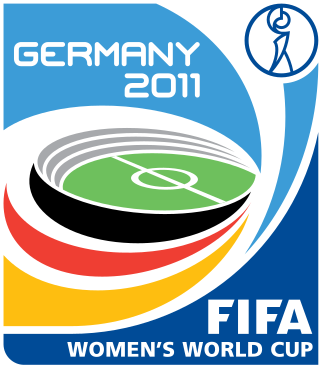
The FIFA Women's World Cup is an international association football competition contested by the senior women's national teams of the members of Fédération Internationale de Football Association (FIFA), the sport's international governing body. The competition has been held every four years and one year after the men's FIFA World Cup since 1991, when the inaugural tournament, then called the FIFA Women's World Championship, was held in China. Under the tournament's current format, national teams vie for the remaining 31 slots in a three-year qualification phase. The host nation's team is automatically entered as the first slot. The tournament, called the World Cup Finals, is contested at venues within the host nation(s) over about one month.

The 1999 FIFA Women's World Cup was the third edition of the FIFA Women's World Cup, the world championship for women's national soccer teams. It was hosted as well as won by the United States and took place from June 19 to July 10, 1999, at eight venues across the country. The tournament was the most successful FIFA Women's World Cup in terms of attendance, television ratings, and public interest.

Birgit Prinz is a German former footballer, two-time FIFA Women's World Cup champion and three-time FIFA World Player of the Year. In addition to the German national team, Prinz played for 1. FFC Frankfurt in the Frauen-Bundesliga as well as the Carolina Courage in the Women's United Soccer Association (WUSA), the first professional women's league in the United States. Prinz remains one of the game's most prolific strikers and is the second FIFA Women's World Cup all-time leading scorer with 14 goals. In 2011, she announced the end of her active career. She currently works as a sport psychologist for the men's and women's teams of Bundesliga club TSG 1899 Hoffenheim.

The 2007 FIFA Women's World Cup, the fifth edition of the FIFA Women's World Cup, was an international football competition for women held in China from 10 to 30 September 2007. Originally, China was to host the 2003 edition, but the outbreak of SARS in that country forced that event to be moved to the United States. FIFA immediately granted the 2007 event to China, which meant that no new host nation was chosen competitively until the voting was held for the 2011 Women's World Cup.

The 2011 FIFA Women's World Cup was the sixth FIFA Women's World Cup competition, the world championship for women's national football teams. It was held from 26 June to 17 July 2011 in Germany, which won the right to host the event in October 2007. Japan won the final against the United States on a penalty shoot-out following a 2–2 draw after extra time and became the first Asian team to win a senior FIFA World Cup.
The Australia women's national soccer team has represented Australia at the FIFA Women's World Cup on eight occasions in 1995, 1999, 2003, 2007, 2011, 2015, 2019 and 2023. Australia co-hosted the 2023 FIFA Women's World Cup with New Zealand. The Matildas automatically qualified as co-host, and the Matildas finished fourth overall. It was the first time that a senior national soccer team representing Australia or another Oceanian country has made it to the World Cup semi-finals. The team also participated in the 1988 FIFA Women's Invitation Tournament, a precursor to the Women's World Cup.
At the end of each FIFA Women's World Cup final tournament, several awards are presented to the players and teams which have distinguished themselves in various aspects of the game.
This is a list of the records of the FIFA Women's World Cup.

Italy have participated four times at the FIFA Women's World Cup: in the inaugural edition of 1991, 1999, 2019 and 2023.

England have participated six times at the FIFA Women's World Cup: in 1995, 2007, 2011, 2015, 2019, and 2023. They have reached the quarter-finals in each of their participation and the semi-finals three times, reaching the final in 2023.
The New Zealand women's national football team has represented New Zealand at the FIFA Women's World Cup on six occasions in 1991, 2007, 2011, 2015, 2019 and 2023. New Zealand is co-hosting the 2023 FIFA Women's World Cup with Australia, and automatically qualified as co-hosts. They have never advanced beyond the group stage.

The United States women's national soccer team is the most successful women's national team in the history of the Women's World Cup, having won four titles, earning second-place once and third-place finishes three times. The United States is one of five countries including Germany, Japan, Norway, and Spain to win a FIFA Women's World Cup.. The United States was also the only team that played the maximum number of matches possible in every tournament until they got eliminated in the round of 16 in 2023.

The Japan women's national football team has represented Japan at the FIFA Women's World Cup on nine occasions in 1991, 1995, 1999, 2003, 2007, 2011, 2015, 2019 and 2023. They are the only Asian team to have won the tournament, as well as the only Asian team to qualify for every edition, and they are the first team that has won the trophy with a loss during the final tournament. They also were runners-up once.
The Nigeria women's national football team has represented Nigeria at the FIFA Women's World Cup at all nine stagings of the tournament, one of seven teams to do so. Despite the rich history, however, Nigeria's successes have been rather modest, having only progressed to the knockout phase in three occasions.

The Germany women's national football team has represented Germany at the FIFA Women's World Cup on nine occasions in 1991, 1995, 1999, 2003, 2007, 2011, 2015, 2019 and 2023. They have won the title twice and were runners-up once. They also reached the fourth place in 1991 and in 2015.
The Norway women's national football team has represented Norway at the FIFA Women's World Cup on nine occasions in 1991, 1995, 1999, 2003, 2007, 2011, 2015, 2019 and 2023. They were runners up in 1991. They won the following tournament in 1995. They also reached the fourth place in 1999 and in 2007.
The China women's national football team has represented China at the FIFA Women's World Cup on eight occasions in 1991, 1995, 1999, 2003, 2007, 2015, 2019 and 2023, finishing as runners up once (1999) and once in fourth place (1995).

The Brazil women's national football team has represented Brazil at the FIFA Women's World Cup on all nine occasions to date. As the most successful women's national football team in South America, Brazil is also the best-performing South American team at the FIFA Women's World Cup, reaching two podium finishes.

The Sweden women's national football team has represented Sweden at the FIFA Women's World Cup on nine occasions in 1991, 1995, 1999, 2003, 2007, 2011, 2015, 2019 and 2023. There were runners up once and four times bronze medalists: in 1991, in 2011, in 2019 and in 2023.
The Canada women's national soccer team has represented Canada at eight of the nine staging's of the FIFA Women's World Cup. The inaugural tournament in 1991 is currently the only edition for which they failed to qualify.











